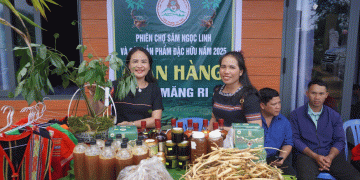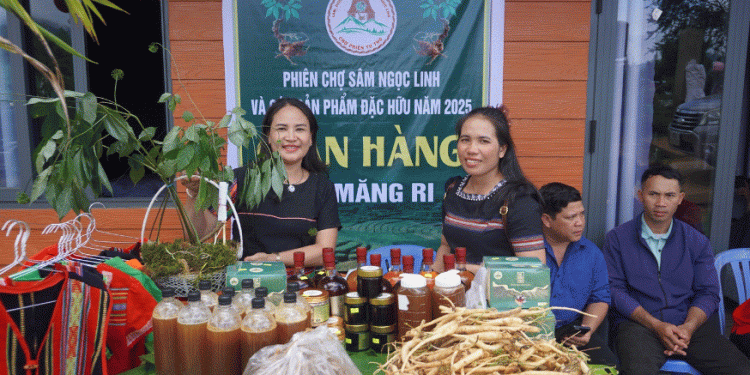On June 8-9, 2024, the Tu Thó Community Tourism Village in Tê Xăng commune (Tu Mơ Rông district, Kon Tum) hosted the Ngọc Linh Ginseng, Medicinal Herbs, and Specialty Products Fair. Organized by the local People’s Committee, the event celebrated the 20th anniversary of Tu Mơ Rông’s establishment while promoting the region’s economic potential in medicinal agriculture and community-based tourism.
A Growing Industry with National Significance
Ngọc Linh ginseng (Panax vietnamensis) is one of Vietnam’s most valuable medicinal plants, with prices reaching $1,500–$3,000 per kilogram for high-grade roots (Ministry of Agriculture and Rural Development, 2023). The Tu Mơ Rông district alone cultivates 3,000 hectares of Ngọc Linh ginseng, part of a broader 4,000-hectare medicinal herb zone that includes other high-demand species like sâm dây (Codonopsis javanica) and sơn tra (hawthorn).
The fair featured 15 stalls showcasing OCOP-certified (One Commune One Product) goods, processed extracts, and sustainably harvested herbs. Notably, an auction of premium ginseng helped raise funds for preserving the Xơ Đăng ethnic culture while connecting farmers with digital-market buyers—a critical step in expanding market access.
Linking Agri-Tourism and Sustainable Farming
Events like this highlight a global trend: agri-tourism can increase farm revenues by 20–30% (FAO, 2023). By integrating tourism with medicinal herb production, Tu Mơ Rông enhances value chains while preserving biodiversity. The fair’s emphasis on eco-friendly packaging and food safety aligns with international demand for traceable, sustainable botanicals—a market projected to grow at 6.8% annually (Grand View Research, 2024).
Challenges and Opportunities
Despite its potential, scaling up Ngọc Linh ginseng production faces hurdles:
- Slow growth: Ginseng requires 5–7 years to mature.
- Counterfeiting: An estimated 30% of sold “Ngọc Linh” ginseng is adulterated (Vietnam National University of Agriculture, 2023).
- Land constraints: Expanding cultivation risks deforestation.
However, partnerships with companies like Kon Tum Ngọc Linh Ginseng JSC and digital platforms can improve authentication and market reach.
The Tê Xăng fair demonstrates how high-value medicinal crops can transform rural economies when combined with agri-tourism and technology. For farmers and agribusinesses, investing in sustainable practices and direct-market strategies will be key to unlocking Ngọc Linh ginseng’s full potential—both domestically and as an export commodity.































